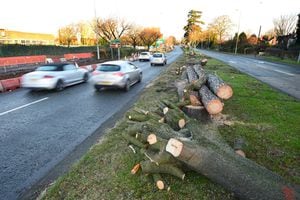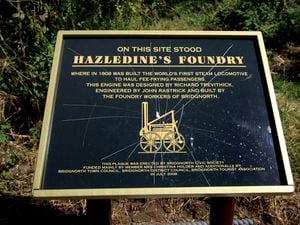6,359 trees axed by councils across the Black Country
More than 6,000 trees have been lost in the Black Country over the past three years.

Dudley Council felled 3,227, Sandwell 2,070, Walsall 901 and Wolverhampton 161.
They include dozens of trees chopped down along Stafford Road as part of a ‘city gateway’ scheme.
3,227 felled in Dudley
Councillor Karen Shakespeare, cabinet member for environmental services at Dudley Council, said: “Trees play an important role in our communities, filtering air, acting as a haven for wildlife, creating attractive landscapes and generally contributing to community wellbeing, which is why we only fell trees that pose a high risk to people or property.
“Many of the trees felled are self sets and have not been specifically planted.
"We will also consider felling if the tree is diseased, damaged, dangerous or dying.”
She added: “We don’t have a replacement programme as such, but we would encourage landowners such as private tenants, schools and businesses to replace their own stock.
“We do seek sponsorship ourselves to invest in new tree stock at suitable locations, such as the 70 plus trees we planted with the help of local businesses on Birmingham New Road.”
The council uses Midland Forestry to carry out all tree maintenance work and plants new trees using council resources.
Sandwell Council chops down 2,070
Sandwell Council said it did not have a planned tree removal programme, and it only brought down diseased, damaged and dangerous trees.
It uses an in-house team and three external contractors.
Over the three years, the council said it had replanted more than 240 trees, which cost around £112 each to fell.
Councillor David Hosell, cabinet member for highways and environment, said: “We only fell diseased, damaged or dangerous trees. We have also planted more than 240 new trees in this three-year period.”
Trees were chopped down as part of work on Witton Flood Scheme in Sandwell Valley Country Park.
The work is to help protect the River Tame – which runs through Sandwell Valley and passes through Perry Barr – from bursting its banks.
901 cut down in Walsall
Councillor Louise Harrison, portfolio holder for clean and green at Walsall Council, said: “All local authorities have a duty to protect natural heritage and value the asset that is their tree stock – and Walsall is no exception to this.
“Trees are generally only felled when they are dead, dying diseased or dangerous, for example, by storm damage.”
“However, in our countryside sites, trees may be felled as part of the long-term planned management of the sites to support the greatest diversity of plants and animals.”
More than 40 trees on land off Erdington Road in Aldridge are to be knocked down under plans for four large homes.
Walsall Council approved the proposal, but some local residents aren't happy.
Mark Ryder, on behalf of community group Saving Aldridge Trees, said: “Councils have got expectations from the Government over the number of homes being built, and they get rewarded.
“This is happening to the detriment of the environment.”
161 chopped down in Wolverhampton
The cost of felling the 161 trees from 2014 to 2017 came under the arboriculture budget for, which was a staggering £852,385 over the three years.
A total of 6,359 trees have been cut down by councils across the Black Country in the time, a Freedom of Information request has revealed.
Campaigners fear many others have also been lost through private fellings in the same period.
There are plans to remove more trees in Wolverhampton including some next to The Lighthouse Media Centre in Fryer Street and two at the former Danesmore Park Primary School, in Russell Close, ahead of redevelopment.
Plans were also approved to fell a dead oak and three beech trees at the Royal Wolverhampton School in Penn Road last August.
And last year, 46 trees were chopped down by workers on the £6.4 million ‘city gateway’ project on Stafford Road.
The scheme, between M54 junction two and Springfield Lane, will see the road widened.
The city’s council said it would be planting almost 300 new saplings in the area.
A spokesman for the authority said: “As a council, we have a responsibility to remove trees that pose a risk to health and safety and property or have an impact on key services that benefit our city.
“For instance, tree-felling takes place due to thinning and diseased trees as well as making way for highway improvements and construction works.”
He added: “The annual budget for arboriculture covers a wide-range of operations including routine maintenance and inspection of the city council trees.
"When trees are felled, we endeavour to compensate areas affected by replacing additional planting to keep Wolverhampton a green and vibrant city.”
National issue
Trees can be protected by Tree Preservation Orders, which means approval is needed from a council to knock them down. Trees within conservation areas are also protected.
The issue has made national news this month as protesters battle with Sheffield City Council over its controversial tree-felling scheme, which has seen 5,500 cut down.
Andi Mohr, chairman of the West Midlands Green Party, said: “In Sheffield, protesters are in the middle of a huge battle, yet we’ve lost even more trees here in the Black Country than they have – it’s ecological vandalism.”
He added: “It’s shocking to hear that we’ve lost over 6,000 trees across the Black Country in the last few years.
“Nobody objects to removing dangerous or diseased trees, but that will be a tiny proportion of this number.
"Trees play a vital role in our towns absorbing nasty chemicals that pollute our air, by trapping them in their leaves and bark.
“When we have 3,000 people a year dying early in the West Midlands because of our dirty air, it’s madness to remove so many trees that clean our air.
“Not only that, but trees provide an important habitat for urban animals like bats, birds, bugs and small mammals.”





